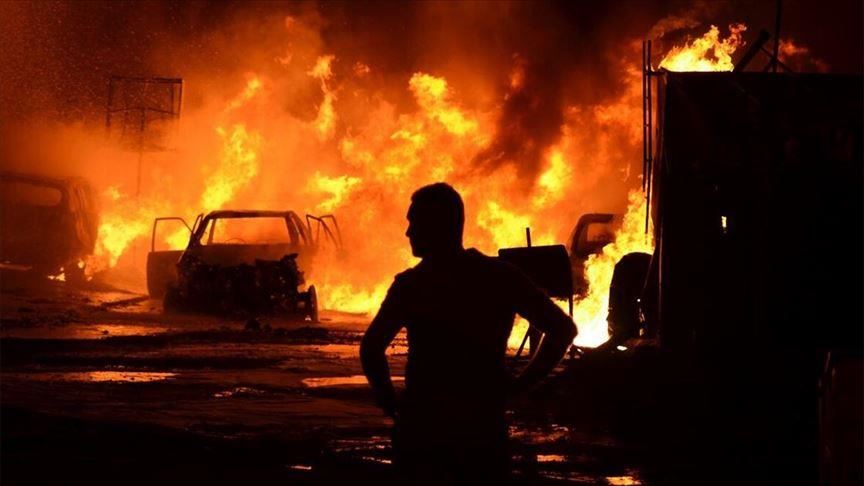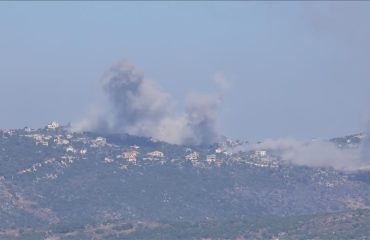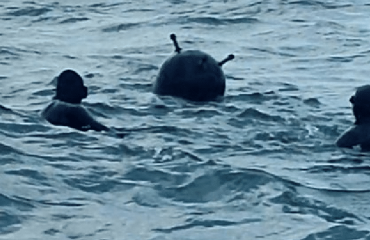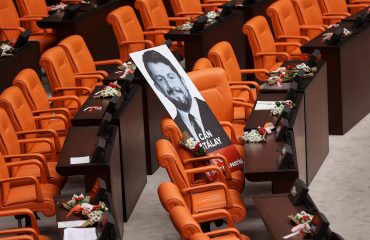

The US military responded to the killing of three American soldiers in a drone strike in Syria by an air raid on Bagdat on February 7, resulting in the death of the leader of the pro-Iranian Iraqi Hezbollah. Power politics is extending its influence globally and regionally, with its repercussions being observed in domestic politics as “security politics” that will likely have an impact on local elections. (Photo: AA)
On the evening of February 7, a car exploded and caught fire in Mashtel, a Shiite neighborhood in Baghdad. Shortlye thereafter, the US Central Command (CENTCOM) claimed responsibility for the airstrike in a statement; it was in retaliation for the killing of three American soldiers in a drone strike on January 28 against the secret US military base “Tower 22” on Syrian territory on the Jordanian-Syrian-Iraqi border. The Iranian Revolutionary Guard-backed militia Hashd al-Shaabi later confirmed to the official Iranian news agency IRNA that the man killed in the vehicle was Abu Bakr al-Saadi, one of the leaders of the Kata’ib Hezbollah organization under their umbrella.
This incident is the latest manifestation of a trend in power politics that is proliferating globally, and it’s safe to predict that this won’t be the last occurrence.
“The strongest has the right”
The phrase “Macht geht vor Recht” (“Might is right”), or colloquially, “the strongest has the right,” was attributed to German politician Otto von Bismarck during a parliamentary session in 1863, which he later denied. As there were no cell phones or parliamentary minutes at the time, it could not be proven. However the concept of power politics played a decisive role in international relations leading up to the great war of division in 1914 (not yet called the first because the second one had not yet broken out).
As an example, the Ottoman Empire was labeled “sick” and it was considered “right” to be divided among the “powerful” states, Britain, France and Russia. The Ottoman Empire found the solution in relying on Germany.
One of the pillars of the new world order established after the Second World War was the nuclear balance between the US and the Soviet Union. In addition to the nuclear balance, the United Nations system also curbed power politics to some extent. However, with the collapse of the Soviet Union in 1992, the US attempted to fill the vacuum, but in fact it was filled by China and, in particular, by radical Islamist, transnational armed movements (brought on the scene thanks to the US).
Power politics is back on the agenda
Today, policies based on “might is right” are resurfacing both globally and regionally.
The Iraq invasion in 2003 by US and UK-led forces marked an early example. Russia seized the Georgian regions of Abkhazia and South Ossetia in 2008. Confident that the US would not go to war with it over two regions in the Caucasus, Russia annexed Ukraine’s Crimean peninsula in 2014. Meanwhile, the Arab uprisings that erupted in 2010 provided the US and Russia with opportunities to showcase their power politics in the Middle East to the fullest extent – especially on the Syrian theatre. Iran too, of course. But the real turning point came in 2022, when Russia launched the war in Ukraine: bringing the the concept of geopolitical importance to the forefront.
One of the most important outcomes of the Ukraine Crisis was the realization that the European Union lacks political power without the physical military protection of the United States. The fact that it remained an economic, cultural and scientific power did not change this.
This period also witnessed Germany’s decision to allocate a military budget of 100 billion euros due to fears of Russia, resembling an armament trend reminiscent of pre-World War II.
Türkiye is not an exception
In fact, power politics is not directly related to the economic power of countries.
For instance, Russia took the Donbas region of Ukraine after Crimea because it could afford to do so. CIA Director William Burns wrote in a recent article that if the US and other NATO powers reduce their arms aid to Ukraine, Ukraine (and the “West”) will lose this power struggle.
For the time being, China’s power is not enough for the Western hemisphere, but in the Eastern hemisphere, in the Pacific region (and in space), its power policies are challenging the US (and its allies like Japan, South Korea, Taiwan) harder than ever.
In line with its theopolitics (religion-based politics), Iran’s military power is sufficient for the Shiite-populated regions of the Middle East; it does so with the common denominator of Israel.
Similarly, Turkey’s economic power may be weaker compared to the EU’s “strong” countries, but its military strength is enough to counter PKK attacks in Syria and Iraq where state power is less effective. This is thanks to Türkiye’s adoption of power politics after the July 15, 2016 coup attempt.
Security politics in the elections
Türkiye’s shift to power politics was largely motivated by President Tayyip Erdoğan’s belief that the United States masterminded the July 15, 2016, coup attempt through the Fethullah Gülen sect, which had turned into an outlawed power-oriented organization.
The purchase of S-400 missiles from Russia demonstrated Erdogan’s departure from solely relying on the American alliance, despite NATO membership, and signaled strategic autonomy even if fulfilling the conditions of being a NATO member.
This decision led Türkiye to use military force in Syria and Iraq (while exploring cooperation with the Iraqi government) and to intervene in neighboring geographies such as Azerbaijan, Libya and the Eastern Mediterranean in line with its own interests.
In Türkiye, as elsewhere in the world, the derivative of power politics in foreign policy translates into security politics in domestic politics.
Local elections as well
Even amid a severe economic crisis, Erdoğan won the 2023 elections by emphasizing security policies, in addition to highlighting the opposition’s incompetence. Elements of power politics, such as the TB-2 SİHA and the Anadolu landing ship, were also employed.
Although the dynamics of local elections differ from general elections, Erdoğan is expected to emphasize security policies in the March 31st local elections. The efforts of the AK Party and MHP to alienate CHP voters from DEM Party support, especially in Istanbul, are indicative of this strategy.


